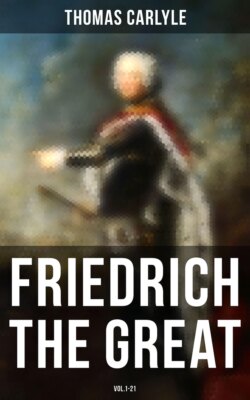Читать книгу Friedrich the Great (Vol.1-21) - Томас Карлейль - Страница 7
На сайте Литреса книга снята с продажи.
2. EIGHTEENTH CENTURY.
ОглавлениеTable of Contents
One of the grand difficulties in a History of Friedrich is, all along, this same, That he lived in a Century which has no History and can have little or none. A Century so opulent in accumulated falsities—sad opulence descending on it by inheritance, always at compound interest, and always largely increased by fresh acquirement on such immensity of standing capital;—opulent in that bad way as never Century before was! Which had no longer the consciousness of being false, so false had it grown; and was so steeped in falsity, and impregnated with it to the very bone, that—in fact the measure of the thing was full, and a French Revolution had to end it. To maintain much veracity in such an element, especially for a king, was no doubt doubly remarkable. But now, how extricate the man from his Century? How show the man, who is a Reality worthy of being seen, and yet keep his Century, as a Hypocrisy worthy of being hidden and forgotten, in the due abeyance?
To resuscitate the Eighteenth Century, or call into men's view, beyond what is necessary, the poor and sordid personages and transactions of an epoch so related to us, can be no purpose of mine on this occasion. The Eighteenth Century, it is well known, does not figure to me as a lovely one; needing to be kept in mind, or spoken of unnecessarily. To me the Eighteenth Century has nothing grand in it, except that grand universal Suicide, named French Revolution, by which it terminated its otherwise most worthless existence with at least one worthy act;—setting fire to its old home and self; and going up in flames and volcanic explosions, in a truly memorable and important manner. A very fit termination, as I thankfully feel, for such a Century. Century spendthrift, fraudulent-bankrupt; gone at length utterly insolvent, without real MONEY of performance in its pocket, and the shops declining to take hypocrisies and speciosities any farther:—what could the poor Century do, but at length admit, "Well, it is so. I am a swindler-century, and have long been—having learned the trick of it from my father and grandfather; knowing hardly any trade but that in false bills, which I thought foolishly might last forever, and still bring at least beef and pudding to the favored of mankind. And behold it ends; and I am a detected swindler, and have nothing even to eat. What remains but that I blow my brains out, and do at length one true action?" Which the poor Century did; many thanks to it, in the circumstances.
For there was need once more of a Divine Revelation to the torpid frivolous children of men, if they were not to sink altogether into the ape condition. And in that whirlwind of the Universe—lights obliterated, and the torn wrecks of Earth and Hell hurled aloft into the Empyrean; black whirlwind, which made even apes serious, and drove most of them mad—there was, to men, a voice audible; voice from the heart of things once more, as if to say: "Lying is not permitted in this Universe. The wages of lying, you behold, are death. Lying means damnation in this Universe; and Beelzebub, never so elaborately decked in crowns and mitres, is NOT God!" This was a revelation truly to be named of the Eternal, in our poor Eighteenth Century; and has greatly altered the complexion of said Century to the Historian ever since.
Whereby, in short, that Century is quite confiscate, fallen bankrupt, given up to the auctioneers;—Jew-brokers sorting out of it at this moment, in a confused distressing manner, what is still valuable or salable. And, in fact, it lies massed up in our minds as a disastrous wrecked inanity, not useful to dwell upon; a kind of dusky chaotic background, on which the figures that had some veracity in them—a small company, and ever growing smaller as our demands rise in strictness—are delineated for us.—"And yet it is the Century of our own Grandfathers?" cries the reader. Yes, reader! truly. It is the ground out of which we ourselves have sprung; whereon now we have our immediate footing, and first of all strike down our roots for nourishment;—and, alas, in large sections of the practical world, it (what we specially mean by IT) still continues flourishing all round us! To forget it quite is not yet possible, nor would be profitable. What to do with it, and its forgotten fooleries and "Histories," worthy only of forgetting?—Well; so much of it as by nature ADHERES; what of it cannot be disengaged from our Hero and his operations: approximately so much, and no more! Let that be our bargain in regard to it.
